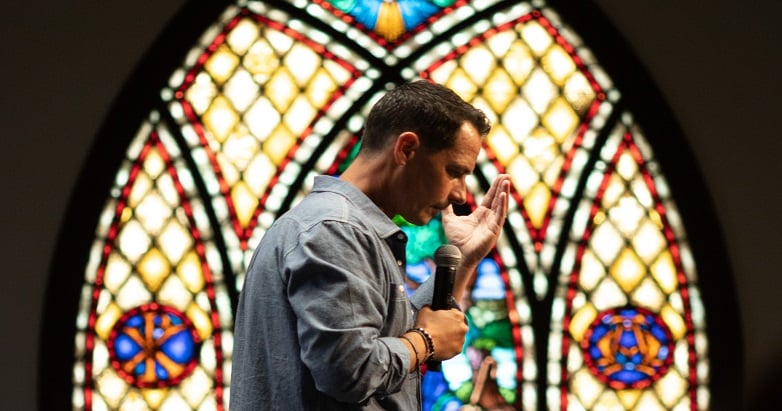If you go to an Evangelical Church, chances are your preacher has a few tricks up their sleeve. I’m not saying your pastor is deceptive or tricky. But within the culture of Evangelical preaching, there are certain tricks of the trade that pastors learn from their preaching mentors, who modeled their preaching after the ministers before them. Perhaps they never stopped to think about what’s behind some of the homiletical techniques that they employ. And maybe if they did, they would realize that some of them can be manipulative.

Some Tricks of the Trade:
- “Turn to your neighbor and say…” This is generally a sermon warm-up. Typically, the preacher follows up with a command to say something ridiculous to the person next to you. This is a rhetorical device designed to garner a laugh. Generally, it has nothing to do with the sermon, so it seems a little out of place. It’s designed to get people in a good mood. But there is a nefarious side to this silly preaching device. If the speaker can get his listeners to follow such ridiculous instructions, then he can get them to follow his teaching instructions as well. It’s a way of training the listeners to be obedient.
- “Somebody, say, ‘Amen!’” Or, “Can I get an ‘Amen?’” This technique serves a double function. First, by asking the audience to affirm what she has just said, the preacher converts her audience from noncommittal hearers to committed listeners. Second, the preacher may be generally insecure or nervous about how people will receive her message. This rhetorical device is a request for affirmation that helps the speaker’s insecurity.
- “And all God’s people said…” This one is tied closely to the above technique of asking for approval or agreement. The difference is that preachers use “And all God’s people said” when they’re praying, not usually when they’re preaching. The response that you’re supposed to know (if you’re part of the in-crowd) is, “Amen!” So, this technique serves two purposes. First, it asks for agreement or approval. Second, it distinguishes insiders from outsiders. If you’re an outsider and you want to be an insider, you’d better learn the responses.
- “God is good (all the time), and all the time (God is good)!” This innocuous phrase drives me nuts because its logic is so ridiculously obvious. “A=B,” says the pastor, and the people repeat, “B=A!” as if they’d said something profound. Another one I’ve heard that follows the same logic is, “What kind of man is a godly man?” Then the congregation replies, “A godly man is a man of God!” Yep, A=B; B=A. This phrase falls into the category of, “I just got you to do what I told you to do!” Plus, it distinguishes insiders from outsiders, just like the previous trick of the trade.
- “God gave me a word,” or, “God laid it on my heart…” This is code for, “Everything I’m about to say is indisputable because it is straight from God. Here, the Evangelical preacher speaks ex-cathedra. Who can question what the minister says if God told him to say it?
- “Dear Father (or Lord) Weejus…” In prayer, many people add the word just after the word we, making it sound like When praying, many pastors and others use the phrase, “Dear Lord Weejus,” or “Dear Father Weejus.” On the surface, this sounds like humility. “Dear Lord, we just thank you” means that “all we are doing is thanking you.” Or, “Dear Lord we just ask…” means we are simply asking. The problem is that this phrase that sounds humble is really self-denigration. It turns the praying person into a lowly petitioner. It turns a request into a groveling entreaty. We don’t need to grovel before God. Dear Lord Weejus tells people that they have no real right to ask for what they are requesting in prayer. It’s designed to keep the people weak and subjected.
- “Holy Spirit, fill us again…” The idea of filling up your God tank suggests that you could ever run out of God, like a car running on empty. The notion that we need more of God in our lives (another similar phrase) implies that there is a lack of God in the universe. Since God is omnipresent at all times, we neither need nor is it possible to get, more of God. In fact, we can never have less of God. The notion of filling up your God tank is a preaching device designed to keep people coming back to church as if it is their local Exxon station.
- “How many know that…” Similar to “Can I get an ‘Amen,’” the preacher uses this phrase to ask for affirmation. But in this case, he asks people to raise their hands if they know that what he is saying is true. “How many know that you can’t get to heaven on roller skates? You’ll roll right past those pearly gates!” It’s like in a church business meeting where you want to clarify the vote by a show of hands instead of people saying “Aye.” The show of hands just goes one step beyond, “Can I get a (verbal) ‘Amen?’” The fact that the preacher is asking how many people know this or that underscores the idea that Christianity and salvation are all about having the right knowledge and believing the right doctrine.
- “This isn’t my opinion; it’s the Bible…” This is similar to “God gave me a word” and “The Lord laid it on my heart.” But, instead of direct divine inspiration, the preacher relies on the notion that the secondhand information you get from the Bible is word-for-word from God. And they insist that when they preach, it’s 100% Bible and 0% interpretation. Since you only hear inerrantists using this expression, this is equivalent to the preacher claiming infallibility. If a pastor has his congregation convinced that the Bible is infallible, he likely also has them convinced that it is possible to preach straight from the Bible without any human interpretation. Of course, as any thinking person knows, it is impossible to read something or teach something without interpreting it.
- “Stop resisting the Spirit!” I’ve heard Charismatic pastors say this when they’re praying over you and you aren’t falling over beneath the miraculous power of their hand on your forehead. Or when you question the doctrine you’re hearing from their mouths. Basically, this means, “Stop resisting me, because you know I’m a vessel of the Holy Spirit!”
- “Every head bowed, and every eye closed…” This is a complicated one, so hold on! For those unfamiliar with this phrase, typically the pastor says this in preparation for an invitation or altar call. It’s similar to “Turn to your neighbor and say…” If the pastor can get her audience to close their eyes and bow their heads when they are told to, then she has succeeded in making them obedient. Particularly if she says something like, “Don’t you dare look around.”
Once every head is bowed and every eye is closed, the preacher usually follows up by saying something like, “Now raise your hand if you want to receive Jesus as your savior. Lift up a hand if you need to confess sin in your life. Every head is bowed, and every eye is closed. Nobody’s looking.”
Of course, that means nobody is looking except the preacher. You know the preacher is looking when she says, “Yes, there’s a hand. And there’s another. God sees you. Bless you.” If your head is bowed and your eyes are closed, you presume that the pastor is saying these things each time a hand slips up into the air. Maybe that’s true, and perhaps it’s not. But as the pastor continues to say things like, “There are hands going up all over the room this morning,” you trust that this is a mighty move of the Holy Spirit—whether there are actually any hands raised or not. Because with every eye closed, who could tell?
Since you perceive that other people are raising their hands, you lift yours as well. “Now look up here,” the preacher says. Everyone raises their heads and looks at the minister. She continues, “Jesus never called anybody privately. He always called them publicly. So now if you raised your hands, I’m going to invite you to come to the front so I can pray for you.”
Now you look like a deer caught in the headlights, or rather, caught by the pastor’s bait and switch. You raised your hand because you thought it was a private moment between you, God, and maybe the pastor. And now, your minister is telling you to step out in front of everyone. You never signed up for that, but you can’t exactly stay in your seat since the preacher saw you raise your hand. Don’t be mistaken, this is all about control. And it’s one of the best ways to drive a crowd of people right to the altar.
Not Bad Pastors—Just Bad Catch Phrases
I’m certainly not trying to point a finger and say that your pastor is trying to manipulate you. No doubt, they have the purest of intentions and would think of these techniques as persuasion rather than manipulation. Some of these phrases are so ingrained that most pastors who grow up in Evangelical preaching culture never think about them one way or another. They just find themselves repeating things they heard from their own preaching mentors. I’m sure I used some of these tricks of the trade when I was a pastor, and I never meant anything malevolent.
When You Know Better, You Do Better
If you attend an Evangelical church, I’m certain you have heard these oratory devices before. I invite you to see these for what they are, and not be manipulated by them. Try not to get trapped by the group-think of these catchphrases.
If you are a well-meaning, good-hearted pastor who has never thought about these things before, I challenge you to examine why you say what you say. Some of these sayings roll right off the tongue—but as James said, the tongue can do great damage. Let’s be a bit more intentional and careful about the things we say from the pulpit. Let’s make sure our preaching is always designed to convince, and never to control.












